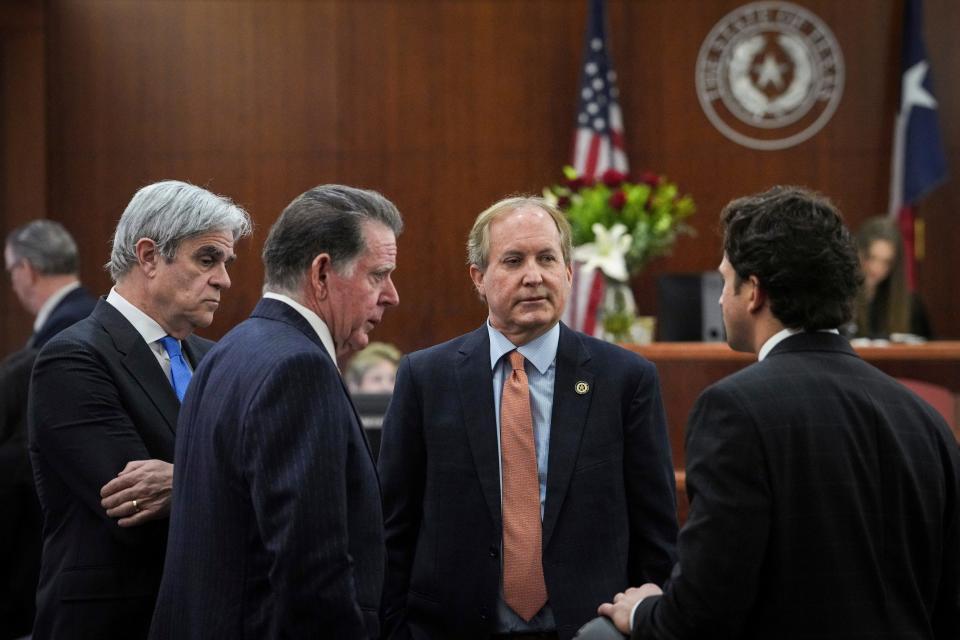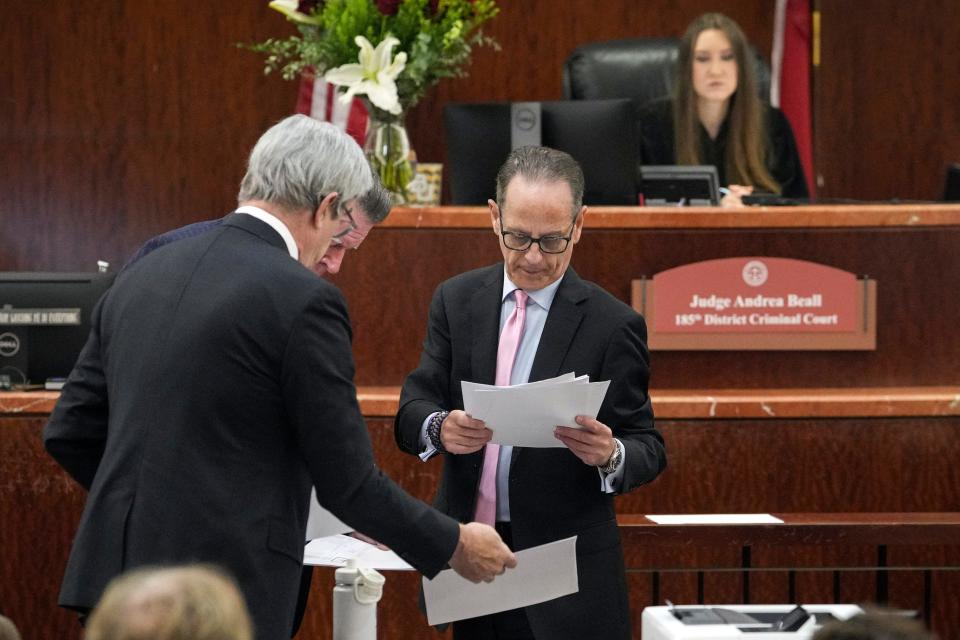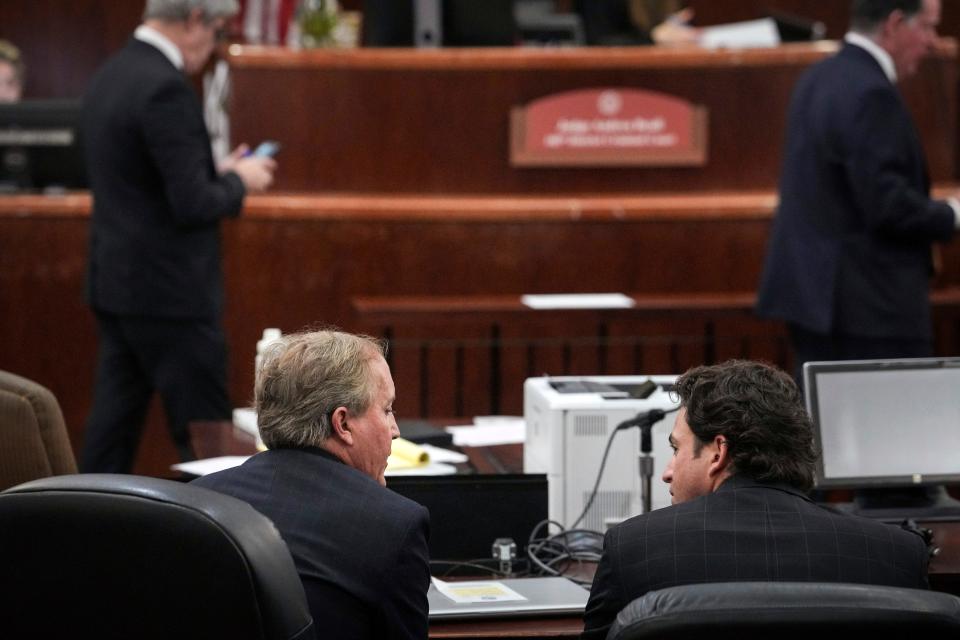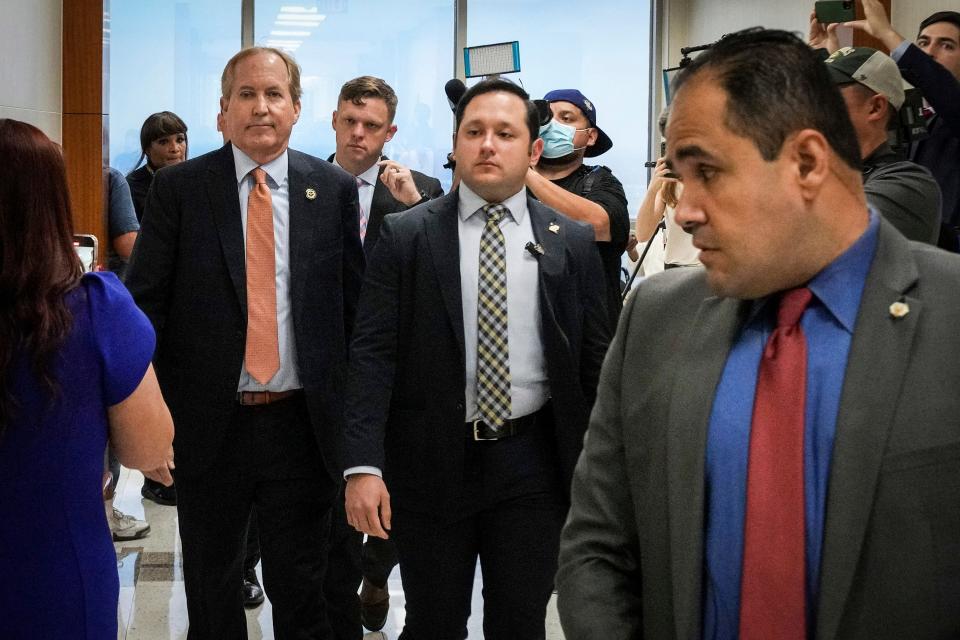Texas Attorney General Ken Paxton to be tried for felony securities fraud on April 15
- Oops!Something went wrong.Please try again later.
HOUSTON — A state District Court judge on Friday dismissed embattled Texas Attorney General Ken Paxton's last-ditch motion to have a nearly 9-year-old felony securities fraud case against him dismissed, rejecting his defense team's argument that the state was responsible for unconstitutionally lengthy delays. The judge instead kept the case set for trial in Houston in two months.
The pretrial hearing Friday, in which Paxton was present but quiet, was animated with repartee between Dan Cogdell, Paxton's defense attorney, and state special prosecutor Brian Wice, a Houston criminal defense attorney.
In the courtroom, Cogdell noted that the case "has been pending longer than three out of my four marriages lasted," and he argued that the state was responsible for the yearslong delay by participating in a fight over whether prosecutors could be paid for their work.
"Not one time in my life have I ever seen a case put on pause due to a fee dispute," Cogdell said in the 185th District Court hearing in Houston. He acknowledged later in the hearing that he believed lawyers should be paid for their work.
Wice and special prosecutor Kent Schaffer, who announced he was withdrawing from the case at the end of the hearing, were promised a rate of $300 per hour when the case began in 2015. Wice said in court that both of their normal rates are "exponentially higher" than that. But Paxton filed a motion challenging the attorneys' fees in December 2015, the prosecution noted, and the pair were locked into litigation with a Paxton donor who filed lawsuits to challenge their pay for several years.

In the courtroom Friday, Cogdell said that Wice "drives a Mercedes-Benz with vanity plates reading 'HABEAS,'" and that Schaffer drives a Rolls-Royce.
"It's a Bentley," Wice corrected him.
Paxton's three-lawyer defense team had filed the motion to dismiss the case Feb. 6, months after Democratic District Court Judge Andrea Beall scheduled the long-anticipated trial for April 15.
A grand jury in Collin County, Paxton's home turf, indicted him in 2015 on three felonies, charging that Paxton, then a state senator from McKinney, had defrauded investors in a tech company by failing to tell them he would financially benefit from their investments.
Between 2015 and 2017, the prosecution fought the defense to have the case moved to Houston, where they argued Paxton would face a fairer trial than in the county that he had represented for 10 years in the Texas House and for two years in the state Senate. Paxton had just been elected to the state's top lawyer's office when the charges came down. The case was on hold while the prosecutor pay disputes continued.
Beall, the fourth judge to preside over the case, ruled in November that the lawyers were owed back pay for their work since 2016, but that case is tied up in a criminal appeals court.
Beall indicated she was surprised when on Feb. 6 she received Paxton's motion for dismissal, saying, "It was this court's understanding that all parties were in agreement on that trial date." Paxton had not filed a separate motion requesting a speedy trial earlier in the case.
Both parties agreed to reconvene March 20 to discuss evidence, as per a request by Cogdell. The ruling from Beall means the proceedings will go forward beginning April 15, after which a Harris County jury will decide whether Paxton is guilty of felony securities fraud. The federal charges carry penalties of up to 99 years in prison.

Wice fought vehemently against the notion that state special prosecutors were money-grubbing in their request to be paid, saying, "We are not indentured servants."
For his prosecutorial partner, however, long-running frustrations over compensation boiled over. In a surprise turn at the end of the hearing, Schaffer said he would file a motion to withdraw, and Wice appointed Jed Silverman, another well-known Houston criminal defense attorney, in his place.
Beall did not object, but implied Paxton's team could file a formal appeal if it found legal grounds to do so. She also said she couldn't guarantee Silverman would be paid.
In a news briefing, Wice chalked up the change to a "strenuous disagree(ment)" on strategy, saying he was committed to taking the case to trial while Schaffer wanted to resolve it with a "pretrial intervention." A pretrial intervention is a contract that resembles probation and is "appropriate for some first offenders" who are "good people (who did) something stupid," according to the Texas District and County Attorneys Association website.
"That (idea) was worse than a slap on the wrist," Wice told reporters. "That was, 'Gee, let's get you a cocktail, a hot meal and breath mint.' And that wasn't going to happen on my watch."

But Schaffer was more blunt, telling the American-Statesman that he didn't think the state would ever compensate him for the time it would take him to prepare for trial and that he wasn't interested in continuing to work for free.
"This isn’t a passion project," he said after the hearing.
Silverman said trying the case is essential to show that Paxton isn’t above the law.
"This case is important to the jurisprudence not only of the state of Texas, but of the United States," Silverman told the Statesman. "No matter who you are, whether you're the president, whether you're General Paxton, nobody's above the law, and what is that? It's citizens deciding whether or not you committed an offense, and that's it."
The fraud case is the longest-running of the scandals and legal troubles that have plagued Paxton throughout his three-term tenure as attorney general.
One of the most conservative attorney generals in the country, Paxton has fought for laws such as Senate Bill 8, which made Texas the first state to enact a six-week abortion ban in the 21st century, and he has sued the federal government over everything from voter fraud allegations to concertina wire at the U.S.-Mexico border.

In September, Paxton defeated an attempt to oust him from office after the Texas House on May 27 overwhelmingly voted to impeach him on 20 charges, including bribery and abuse of office. Ultimately, the state Senate, largely along party lines, voted to acquit Paxton on the charges. Cogdell was also on Paxton's impeachment defense team.
The House opened the investigation into Paxton after rejecting to pay for a $3.3 million settlement agreement between him and four of his former top aides who filed a whistleblower suit against the attorney general. The aides said they were fired after complaining to the FBI about Paxton's possible criminal misconduct in helping Austin real estate investor Nate Paul with legal favors for which, they said, Paul paid for a kitchen remodel at Paxton's home in Austin and offered a job to a woman the attorney general reportedly had an affair with.
In January, Paxton filed a motion seeking to end the whistleblower suit, saying he would not contest the case's facts and would accept any judgement.
A senator who voted to acquit Paxton of the impeachment charges has called on the Senate to reexamine the case. Lt. Gov. Dan Patrick — who leads the Senate, presided over the impeachment trial and is a close Paxton ally — has not responded to the request by Sen. Drew Springer, R-Muenster, to reexamine the attorney general's impeachment.
This article originally appeared on Austin American-Statesman: Judge denies Texas AG Ken Paxton's speedy trial motion in fraud case

